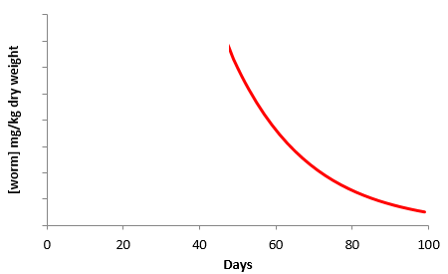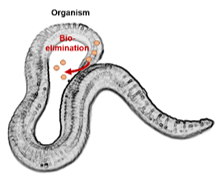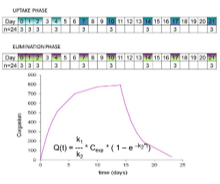Elimination rate
Elimination rate indicates the speed at which an organism excretes material. The elimination rate constant (k2) has the unit day-1, indicating the fraction eliminated each day. Similarly to the uptake rate, different routes of elimination are generally considered conjointly when evaluating the elimination rate, although route specific rates (e.g. for dermal versus faecal elimination) can be assessed and included in the modelling.

Concentration in an organism over time of a given material when only elimination takes place (graph starts at 50 days when organism is moved to clean medium) |
Used for |
 Bio-elimination |
|
Algorithms |
Procedure |
|
Elimination of a single form of the NM: 1. Uptake phase (when exposed in contaminated medium) \(C_{org} = C_{env} \ast k_{1}\ast SF\ast t+ C_{env}\ast\frac{k_1}{k_2+k_g} \ast (1 - e^{-(k_{2}+kg)\ast t})\ast (1-SF)\) 2. Elimination phase (when exposed to clean medium after tm days in contaminated medium) \(C_{org} = C_{env}\ast k_{1}\ast SF\ast t_m+C_{env}\ast \frac{k_1}{k_2+k_g} \ast (1 - e^{-(k_{2}+kg)\ast t})\ast e^{-(k_2+k_g)\ast (t-t_m)} )\ast (1-SF)\) |
|
Read more |
Read also |
|
Visit the NanoFASE Library to read summaries: |
Handy et al 2018. Proposal for a tiered dietary bioaccumulation testing strategy for engineered nanomaterials using fish. Environ Sci Nano 5, 2030–2046. DOI: 10.1039/C7EN01139C van den Brink N.W. et al. 2019. Tools and rules for modelling uptake and bioaccumulation of nanomaterials in invertebrate organisms. Environ Sci Nano 6, 1985-2001. DOI: 10.1039/C8EN01122B
|
Contact

Nico van den Brink
Email: Nico.vandenbrink@wur.nl

